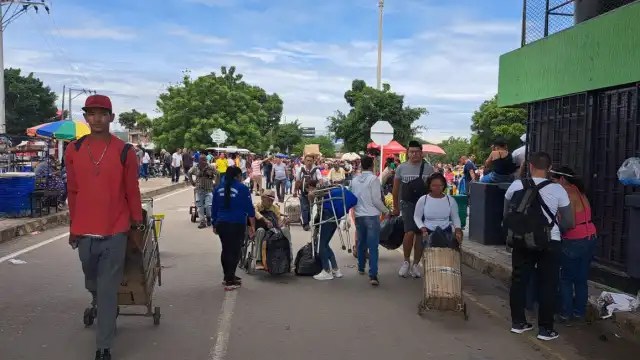
The raging inflation in dollars and pesos that is registered in Táchira forces hundreds of its people to travel to Cúcuta to do the shopping for their homes. In this border State of Venezuela, residents are hit by both the country’s economic crisis and the devaluation of the Colombian currency.
By Anggy Polanco / La Patilla Correspondent
The people of Táchira State, who had reduced the frequency of their visits to Cúcuta to buy food as a result of the fact that a large part of the Colombian products could be bought throughout the state at almost the same price as in North American supermarkets, but now once again they are subject to the transfer of foodstuffs in wheelbarrows and food packages to stock their pantries.
Jean Castañeda, a resident of Capacho, said that he has to cross the border now and again to buy the basic food basket, since in Cúcuta the prices are much better.
“It’s not like above (Táchira) where everything is dollarized and more expensive,” he said.
Although in the town of Capacho he does find some products, in the small Andean town they are resold at prices well above what they cost in the capital of Norte de Santander, Cúcuta.
Traveling down to Cúcuta or Villa de Rosario, Jean Castañeda saves between 1,000 pesos and 1,500 pesos per product, he said.
Another group of “tachirenses” goes to the Colombian Department for medical checkup and appointments because prices are lower in private healthcare centers. Such is the case of Nelly Cuadros, who goes with her mother to the neighboring country to receive medical attention.
“It’s unfortunate, but it’s much cheaper on this side,” said Nelly, since in Cúcuta they can get appointments with specialists for half the price of what they can cost in San Cristóbal.
But 46 days after the border was opened for international cargo, the people of Táchira must continue to cross the binational bridges on foot, under the sun or rain, now with the hope that in January they will finally enable private traffic and direct public transport from San Cristóbal to Cúcuta.
Moving across the border on foot makes the trip more expensive, because many people must pay for the service of forklift drivers to help them carry the weight of a decent food stock purchase for their families.

